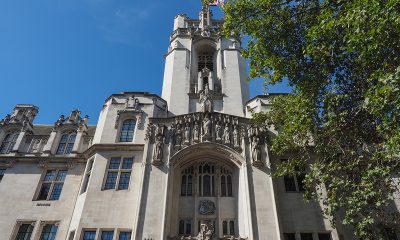National
Marsha P. Johnson Institute honors, uplifts Black trans lives
Elle Moxley on ‘making the full humanity of our existence visible’

Marsha P. Johnson — a towering figure in the Stonewall Rebellion — would have celebrated her 77th birthday this week. Johnson was an outspoken advocate for gay and trans rights, and the “P” in her name stood for “Pay it no mind” — her response when asked about her gender.
In honor of the late activist’s birthday, the Blade sat down with Elle Moxley, founder of the Marsha P. Johnson Institute, to discuss how Johnson’s legacy lives on.
BLADE: When and why did you found the Marsha P. Johnson Institute?
ELLE MOXLEY: The Marsha P. Johnson Institute launched in 2019, and my founding of the organization was in response to the consistent murders that were being reported of Black trans women across the country. I have spent many years working as an organizer and activist, and I saw that there was a gap in social justice spaces — in terms of the solutions that were being generated in response to those murders, but also to the systemic and structural violence that existed around Black trans people and Black people period.
The organization was named in honor of Marsha P. Johnson to affirm the movement that Marsha spearheaded and to create a space where the movement of today had a place to live, without disregarding the history of so many that came before.
BLADE: Can you tell me about the spirit of Marsha P. Johnson that you see in the Institute?
MOXLEY: The fight for equity is something that we see as an evolvement of Marsha’s belief in equality, and we recognize that Marsha was very visible in a movement that did not always reflect faces that looked like hers, in terms of what we understood about LGBTQ rights or LGBTQ people. Knowing that Black trans people exist outside of our deaths and outside of our murders is really where we see the evolvement of our work at the Institute, but that evolvement would not even be possible if Marsha had not made herself visible on the front lines of her activism. It is in that regard where we see ourselves very much mirroring a model that she created for the movement, and we have certainly held up the torch and are carrying it forward.
BLADE: The Institute’s Starship Artists Fellowships are set to begin soon — what are your hopes for the new program?
MOXLEY: With all of our new programming, it really is our hope that we are changing the culture of global societies — that we are not only making Black trans people visible, but we’re making the full humanity of our existence visible. The artists’ fellowship was created to pay homage to the visionaries that exist in the Black trans community. There’s a Black trans renaissance that certainly is underway, and we want to continue to support that function of movement. A lot of people assume that movement is literally about protesting — and that certainly is a big part of it — but there are other ways that you can resist but also practice your joy. We really want it to mirror that Black trans people are joyful — we have joy, and murder is not the only thing we expect to happen to us. Our artists’ fellowship creates space for artists to imagine a bigger picture, a bigger world, for Black trans futures.
I am an artist myself, so that was also a big part of it. Activism is something that Black trans people often have to choose to survive, and we are mad and angry about our circumstances, but we actually are people who have other dreams and desires outside of just fighting for our lives. Marsha P. Johnson again served as an amazing model for movement — her participation in street art and in theater troupes is a reflection of the joy that so many people find outside of their activism.
BLADE: In honor of Black Philanthropy Month and Black August, are there any understudied or underreported causes and freedom fighters that people should be more aware of?
MOXLEY: Just several weeks ago, we lost one of the most important freedom fighters and political prisoners of our time — Albert Woodfox, who was held in solitary confinement for 44 years, the longest solitary confinement in U.S. history. I would say that Black August is always an opportunity for people to understand the structural inadequacies that exist not only in prisons, but in the world. It’s real people who are being housed in prisons, and I say real people because the atrocities of life are often happening to the people who are in cages. I think Black Philanthropy Month creates a space for more investments to happen to organizations who are leading the fight against the apartheid and the segregation that certainly exist in America.
To celebrate the freedom fighters of our time, we are uplifting Black trans freedom fighters who have given their lives to movement, who have given their lives for others. And that’s happening in and outside of prisons — those who are on the inside of prisons are always still advocating for the people in the communities that they believe in, and we are so grateful and thankful to those folks.
BLADE: It seems like most of the recent news about reproductive rights and trans rights has been dismal. Are there any bright spots on your radar, in terms of legislative progress on these issues?
MOXLEY: Anytime a human right is interrupted or taken away, it is such a negative for so many people who are looking for legislation that gives them hope. I will say that I’ve just been hopeful about the future of democracy and of our humanity. I think there are so many activists who have been activated to lead to more generative resolutions around legislation, especially when we think about piecemeal legislation actually being the thing that’s being abolished. That’s the beautiful juxtaposition of what happens when we lose a law — the thing about laws is that they can go away, and they can always return.
If we lean into the positive, we have an opportunity to create more than we originally started with. And that’s the thing that gives me so much hope — we can create more foundational legislation that accounts for the human rights of all people and not just a specific kind. With reproductive justice being at the center of so many of our political conversations, what we are seeing is an expansion of what reproductive justice means and who reproductive justice applies to. And that is what gives me great hope, that we will now be able to account for more than just the abortions of trans men, that we’ll be able to think about the reproductive rights of Black trans women and nonbinary people in ways that we’ve never been able to consider before.
State Department
HIV/AIDS activists protest at State Department, demand full PEPFAR funding restoration
Black coffins placed in front of Harry S. Truman Building

Dozens of HIV/AIDS activists on Thursday gathered in front of the State Department and demanded the Trump-Vance administration fully restore President’s Emergency Plan for AIDS Relief funding.
Housing Works CEO Charles King, Health GAP Executive Director Asia Russell, Human Rights Campaign Senior Public Policy Advocate Matthew Rose, and others placed 206 black Styrofoam coffins in front of the State Department before the protest began.
King said more than an estimated 100,000 people with HIV/AIDS will die this year if PEPFAR funding is not fully restored.
“If we continue to not provide the PEPFAR funding to people living in low-income countries who are living with HIV or at risk, we are going to see millions and millions of deaths as well as millions of new infections,” added King.
Then-President George W. Bush in 2003 signed legislation that created PEPFAR.
The Trump-Vance administration in January froze nearly all U.S. foreign aid spending for at least 90 days. Secretary of State Marco Rubio later issued a waiver that allows the President’s Emergency Plan for AIDS relief and other “life-saving humanitarian assistance” programs to continue to operate during the freeze.
The Washington Blade has previously reported PEPFAR-funded programs in Kenya and other African countries have been forced to suspend services and even shut down because of a lack of U.S. funding. Two South African organizations — OUT LGBT Well-being and Access Chapter 2 — that received PEPFAR funding through the U.S. Agency for International Development and the Centers for Disease Control and Prevention in recent weeks closed down HIV-prevention programs and other services to men who have sex with men.
Rubio last month said 83 percent of USAID contracts have been cancelled. He noted the State Department will administer those that remain in place “more effectively.”
“PEPFAR represents the best of us, the dignity of our country, of our people, of our shared humanity,” said Rose.
Russell described Rubio as “ignorant and incompetent” and said “he should be fired.”
“What secretary of state in 90 days could dismantle what the brilliance of AIDS activism created side-by-side with George W. Bush? What kind of fool could do that? I’ll tell you who, the boss who sits in the Harry S. Truman Building, Marco Rubio,” said Russell.

U.S. Military/Pentagon
Pentagon urged to reverse Naval Academy book ban
Hundreds of titles discussing race, gender, and sexuality pulled from library shelves

Lambda Legal and the Legal Defense Fund issued a letter on Tuesday urging U.S. Defense Secretary Pete Hegseth to reverse course on a policy that led to the removal of 381 books from the Nimitz Library of the U.S. Naval Academy in Annapolis, Md.
Pursuant to President Donald Trump’s executive order 14190, “Ending Radical Indoctrination in K-12 Schooling,” the institution screened 900 titles to identify works promoting “diversity, equity, and inclusion,” removing those that concerned or touched upon “topics pertaining to the experiences of people of color, especially Black people, and/or LGBTQ people,” according to a press release from the civil rights organizations.
These included “I Know Why the Caged Bird Sings” by Maya Angelou, “Stone Fruit” by Lee Lai, “The Hate U Give” by Angie Thomas, “Lies My Teacher Told Me: Everything Your American History Textbook Got Wrong” by James W. Loewen, “Gender Queer: A Memoir” by Maia Kobabe, and “Democracy in Black: How Race Still Enslaves the American Soul” by Eddie S. Glaude, Jr.
The groups further noted that “the collection retained other books with messages and themes that privilege certain races and religions over others, including ‘The Clansman: A Historical Romance of the Ku Klux Klan’ by Thomas Dixon, Jr., ‘Mein Kampf’ by Adolf Hitler, and ‘Heart of Darkness’ by Joseph Conrad.
In their letter, Lambda Legal and LDF argued the books must be returned to circulation to preserve the “constitutional rights” of cadets at the institution, warning of the “danger” that comes with “censoring materials based on viewpoints disfavored by the current administration.”
“Such censorship is especially dangerous in an educational setting, where critical inquiry, intellectual diversity, and exposure to a wide array of perspectives are necessary to educate future citizen-leaders,” Lambda Legal Chief Legal Officer Jennifer C. Pizer and LDF Director of Strategic Initiatives Jin Hee Lee said in the press release.
Federal Government
White House sues Maine for refusing to comply with trans athlete ban
Lawsuit follows months-long conflict over school sports in state

The Justice Department is suing the state of Maine for refusing to comply with President Donald Trump’s executive order banning transgender athletes from participating in school sports, U.S. Attorney General Pam Bondi announced on Wednesday.
DOJ’s lawsuit accuses the state of violating Title IX rules barring sex discrimination, arguing that girls and women are disadvantaged in sports and deprived of opportunities like scholarships when they must compete against natal males, an interpretation of the statute that reverses course from how the law was enforced under the Biden-Harris administration.
“We tried to get Maine to comply” before filing the complaint, Bondi said during a news conference. She added the department is asking the court to “have the titles return to the young women who rightfully won these sports” and may also retroactively pull federal funding to the state for refusing to comply with the ban in the past.
Earlier this year, the attorney general sent letters to Maine, California, and Minnesota warning the blue states that the department “does not tolerate state officials who ignore federal law.”
According to the Maine Principals’ Association, only two trans high school-aged girls are competing statewide this year. Conclusions from research on the athletic performance of trans athletes vis-a-vis their cisgender counterparts have been mixed.
Trump critics and LGBTQ advocates maintain that efforts to enforce the ban can facilitate invasive gender policing to settle questions about an individual athlete’s birth sex, which puts all girls and women at risk. Others believe determinations about eligibility should be made not by the federal government but by school districts, states, and athletics associations.
Bondi’s announcement marked the latest escalation of a months-long feud between Trump and Maine, which began in February when the state’s Democratic governor, Janet Mills, declined to say she would enforce the ban.
Also on Wednesday, U.S. Education Secretary Linda McMahon said the findings from her department’s Title IX investigation into Maine schools — which, likewise, concerned their inclusion of trans student-athletes in competitive sports — was referred to DOJ.
Earlier this month, the Justice Department pulled $1.5 million in grants for Maine’s Department of Corrections because a trans woman was placed in a women’s correctional facility in violation of a different anti-trans executive order, while the U.S. Department of Agriculture paused the disbursement of funds supporting education programs in the state over its failure to comply with Title IX rules.
A federal court last week ordered USDA to unfreeze the money in a ruling that prohibits the agency from “terminating, freezing, or otherwise interfering with the state’s access to federal funds based on alleged Title IX violations without following the process required by federal statute.”
-

 District of Columbia4 days ago
District of Columbia4 days agoFinal push to raise funds, fill D.C. hotels as WorldPride nears
-

 District of Columbia3 days ago
District of Columbia3 days agoReenactment of 1965 gay rights protest at White House set for April 17
-

 Maryland4 days ago
Maryland4 days agoFreeState Justice: Transgender activist ‘hijacked’ Moore’s Transgender Day of Visibility event
-

 Hungary4 days ago
Hungary4 days agoHungarian MPs amend constitution to ban public LGBTQ events










